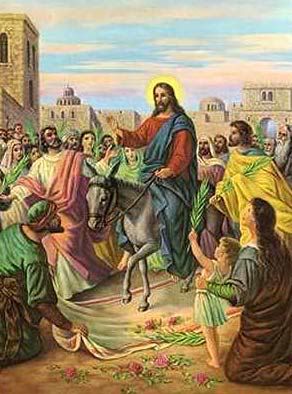Hello My Dear Friends,
Holy Week is the last week of Lent, the week immediately preceding Easter or Resurrection Sunday. In our Church, as in most Christian churches, it is a time to commemorate and enact the suffering, or Passion, and death of our Lord Jesus, through various observances and services of worship. Observances during this week may range from daily liturgical services in churches, or may even include informal meetings in homes, where one may participate in a Christian version of the Passover Seder.
In Lutheran tradition, the conclusion to the week is called the Easter Triduum, or simply referred to as "The Three Days." The Easter Triduum begins on Thursday evening of Holy Week, Maundy Thursday, with Eucharist or Holy Communion, and concludes with evening prayers on Easter Sunday.
Our remembrance of the Lord's suffering and death for the Redemption for our Sins is well served by the solemness of the Holy Week observances, as they call us to move behind the joyful celebrations of Palm Sunday and Easter, and focus on the suffering, humiliation, and death that is part of Holy Week. It is important to place the hope of the Resurrection, the promise of newness and life, against the background of death and endings. It is only in walking through the shadows and darkness of Holy Week and Good Friday, only in realizing the horror and magnitude of sin and its consequences in the world incarnated in the dying Jesus on the cross, only in contemplating the ending and despair that the disciples felt on that long ago Holy Saturday, that we can ever truly understand the light and hope of Sunday morning! In observing this truth, that new beginnings come from endings, many people are able to draw a parable of their own lives and faith journey from the observances of Holy Week. In providing people with the opportunity to experience this truth in liturgy and symbol, the services become a powerful proclamation of the transforming power of the Gospel, and God at work in the lives of people.
The entire week between Palm Sunday and Holy Saturday is included in Holy Week, and some church traditions have daily services during the week. However, usually only Palm Sunday, Maundy Thursday, and Good Friday are times of special observance in most churches.

Holy Week begins Today, with the sixth Sunday in Lent. This Sunday, known as Palm Sunday, observes the triumphal entry of Jesus into Jerusalem that was marked by the crowds who were in Jerusalem for Passover waving palm branches and proclaiming him as the messianic king. The Gospels tell us that Jesus rode into the city on a donkey, enacting the prophecy of Zechariah 9:9,
"Rejoice greatly, O daughter of Zion; shout, O daughter of Jerusalem: behold, thy King cometh unto thee: he is just, and having salvation; lowly, and riding upon an ass, and upon a colt the foal of an ass."
and in so doing emphasized the humility that was to characterize the Kingdom He proclaimed. The irony of his acceptance as the new Davidic King in Mark 11:10,
"Blessed is the coming kingdom of our father David! Hosanna in the highest!"
by the crowds who would only five days later cry for his execution should be a sobering reminder of the human tendency to want God on our own terms.
Traditionally, worshippers will reenact the entry of Jesus into Jerusalem by the waving of palm branches and singing songs of celebration. Sometimes this is accompanied by a processional into the church. In many churches, our included, children are an integral part of this service since they enjoy processions and activity as a part of worship. This provides a good opportunity to involve them in the worship life of the community of Faith. In many more liturgical churches, children are encouraged to craft palm leaves that were used for the Sunday processional into crosses to help make the connection between the celebration of Palm Sunday and the impending events of Holy Week.
This Sunday is also known as Passion Sunday to commemorate the beginning of Holy Week and Jesus’ final agonizing journey to the cross. The English word passion comes from a Latin word that means "to suffer," the same word from which we derive the English word patient. Increasingly, many churches are incorporating an emphasis on the Passion of Jesus into services on Palm Sunday as a way to balance the celebration of Easter Sunday. Rather than having the two Sundays both focus on triumph, Passion Sunday is presented as a time to reflect on the suffering and death of Jesus in a Sunday service of worship. This provides an opportunity for people who do not or cannot attend a Good Friday Service to experience the contrast of Jesus’ death and the Resurrection, rather than celebrating the Resurrection in isolation from Jesus’ suffering.

Wishing You All A Blessed Holy Week & A Glorious Easter,
Phil